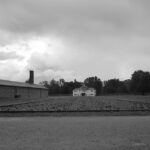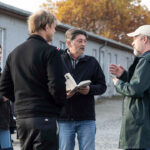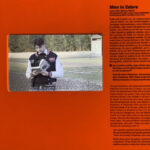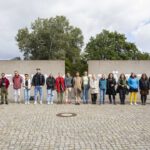The video ‘Pink Triangle: Sachsenhausen’ was made in response to a workshop led by Leona Goldstein: filmed on location at the Sachsenhausen Memorial and Museum, as part of ‚Voices of the Next Generation‘ International Exchange (15 – 18 Sept 2022).
Lotus wanted to do something with lesser-known stories, but in line with what her great-grandfather stood for: tolerance and love of humanity. But also to give a personal interpretation of that in the present.
Lotus Lemaire and myself in conversation with her father Mischa were inspired by a text from the book ‘The Men With The Pink Triangle‘ (1972). Lotus decided to make a large pink triangle to be situated and photographed at the memorial site. I offered to assist on Lotus’s project and we gradually developed a performative intervention which was filmed by Mischa.
The text at the beginning of the video, refers to testimony in the 1972 book ‘The Men With The Pink Triangle’. It was authored by Heinz Heger, which was the pseudonym of Hans Neumann. Neumann had written down the memories of Joseph Kohout, a gay Austrian survivor of Sachsenhausen and Flossenbürg concentration camps. The testimony was written over roughly 15 sessions. The book at the time of publication was one of the few memoirs of the horrific treatment and persecution of homosexuals by the Nazis.
Kohout’s testimony refers to the concentration camp marking system: the identifiers of inverted triangles and numbers, to be sewn on to prisoners clothing: pink triangle for homosexuals. In Kohout’s memoir he recalls an incident where the pink triangle was to be made larger than any other triangle identifier. This is to date, the only known testimony by a gay concentration survivor that documents the larger size of the pink triangle. Despite suggestions of some inaccuracies in Kohout’s testimony made by his partner before the manuscript went to print, the memoir of the ‘larger’ pink triangle nevertheless should not be discredited. As in any testimony from a single surviving witness, especially in the absence of other evidence; this becomes open to scrutiny and to question. But neither should this belie the possibility of truth, even if the haze of time has obscured memory to an extent that may now serve to promulgate the appearance of inaccuracies; or merely through the sheer psychological exhaustion of recounting painful testimony. Perhaps we will never fully know.
After liberation in 1945, those gay concentration camp survivors were reluctant to speak; homosexuality was after all for decades still a criminal offence. As Richard Plant in his book ‚The Pink Triangle‘ notes: “Despite the fact that they no longer had to wear the pink triangles that designated them, they remained marked to the end of their lives.”
Author
George Saxon



